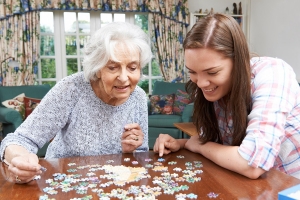The luck o’ the Irish is upon us, as March springs forth it's meadows of four-leaf clovers and golden daffodils. Warmer weather means more time outdoors in the New England region and a perfect opportunity for older adults to engage in fun activities to celebrate St. Patrick’s Day.
You don’t have to be a little leprechaun to enjoy the festivities around St. Patrick’s Day. Older adults can celebrate St. Patrick’s Day with Mad Hatter crafts, Irish dancing, baking traditional Irish treats, playing luck-themed games, or attending parades and community events.
For those who love basketball – you can show-off your team colors in crafty ways during March Madness! And, if there are little leprechauns in your life, invite them to join you at your residence at Everbrook Senior Living.
Mad Hatter Top Hat Craft for St. Patrick’s Day
No matter your age, this craft is a big hit because there are countless ways to design and decorate a top hat. You can work with inexpensive paper craft materials or get really fancy by starting with an actual top hat (check vintage stores or online) that you transform into your own Mad Hatter Top Hat. Let these images inspire your creativity and follow the links for all manner of designs.
Glittery Leprechaun Top Hat – perfect for all ages and particularly fun to do with the grandkids!
Truly a Mad Hatter Fascinator – you won’t find the Queen wearing these fascinators, but you will have a blast designing one! From chic to funky, you determine just how “mad” you want your design to be…or tie in with March Madness and incorporate your team’s logo/colors.
Easter Mad Hatter Top Hat – incorporate the Easter season colors and patterns with this paper-craft design using cardstock.
Lucky Leprechaun Fabric Top Hat – begin with a vintage hat that you want to upcycle or use the cardboard “frame” and decorate with fabric scraps. A great way to bring together your crafty friends to reuse scrap materials!
More top hat design ideas to share with friends and family.
Not Crafty – No Problem! St. Patrick’s Games and Events for Older Adults
Not everyone has a green thumb for crafts. The activities below will keep everyone engaged in the St. Pat’s festivities.
St. Patrick's Day Parades & Special Events – Most local municipalities will “paint the town green” with parades, music or art events, and entertainment. Check with your Everbrook Senior Living concierge for activities in the local area including those at art museums, libraries, restaurants, and parks and recreation venues. (FYI: In New England, Daffodil Festivals are very popular!)
Irish Trivia Night – Whether you use index cards or PowerPoint to set up a game and see who knows the most about all-things-Irish film, books, art, or history... trivia night is a fun way to learn together. Consider adding prizes for the individual and/or team with the most points.
Gold Coin Toss Game – You might not shoot hoops anymore, but we bet you can get a gold coin in a pot that’s a few feet away. Get your teams together, line up your leprechaun pots and give each team 20-25 gold coins (the plastic kind).
The goal: get as many gold coins in the pot as possible from behind the line of demarcation. Two teams of 2-5 each compete against each other to progress to the “playoff”. (All teams should have equivalent number of players and each player gets the same number of coins). The team that has the most coins in the pot after each round moves on until only one team remains. Plan to have a great prize for the semi-finalists and finalist, too.
Irish Movie Night – we’ll just give you a few new and classic movies that revolve around Ireland, Irish themes, or Irish actors. Pop some green popcorn, serve your favorite beverages, and green-themed treats to share. The Banshees of Inisherin, The Devil’s Own, The Wind that Shakes the Barley, Ondine, Calvary, Leap Year, Waking Ned Devine, The Luck of the Irish (young adult/family with basketball theme), Gangs of New York – search your favorite streaming service or Google for more film ideas.
Irish Baking Bonanza – from soda bread to clover-shaped cookies to lime-green scones and mint-chocolate chip pie (with or without the Baileys!), you can find a great variety of Irish themed recipes online. Whether you all bake together or simply come together to share your creations, there’s sure to be something for everyone to enjoy before the day is done. Check out these Irish treats from the folks at Delish!
An Intimate Irish Evening – just the two of you or an intimate group of friends? Plan an Irish luncheon or dinner with the traditional recipes from “the great island”.
Irish Jig Dance – Bring in the Irish steppers and jig dancers to teach lessons to your friends and family... then have a Jig Dance-off. For those with arthritis, a line dance or chair dancing is a great alternative.
We hope you have a lucky St. Patrick’s Day, rich with the blessings of good health, the comforts of a nurturing home, and the bonds of friendship. That’s exactly what you’ll find at Everbrook Senior Living – a community of support that suits your lifestyle and meets your unique social, emotional, and health needs. To learn more about our first-in-class amenities, residential lifestyles, and specialized services call today to schedule a tour.






